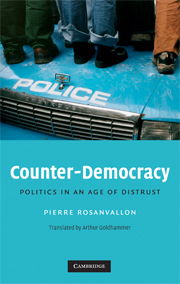Book contents
- Frontmatter
- Contents
- Foreword
- Introduction
- Part 1 Overseeing democracy
- Part 2 The sovereignty of prevention
- Part 3 The people as judge
- Part 4 Unpolitical democracy
- 11 The sense of powerlessness and symbols of depoliticization
- 12 The populist temptation
- 13 Lessons of unpolitical economy
- 14 Conclusion: the modern mixed regime
- Index
- References
13 - Lessons of unpolitical economy
Published online by Cambridge University Press: 24 May 2010
- Frontmatter
- Contents
- Foreword
- Introduction
- Part 1 Overseeing democracy
- Part 2 The sovereignty of prevention
- Part 3 The people as judge
- Part 4 Unpolitical democracy
- 11 The sense of powerlessness and symbols of depoliticization
- 12 The populist temptation
- 13 Lessons of unpolitical economy
- 14 Conclusion: the modern mixed regime
- Index
- References
Summary
To reiterate a point made repeatedly in previous chapters, it was the inability of electoral-representative politics to keep its promises that led to the development of indirect forms of democracy. A similar phenomenon can be observed in the economic sphere, where frequent market failures gave rise to various mechanisms of oversight. Because market forces continued to evolve as this was taking place, different modes of “indirect regulation” emerged. Negative forms of oversight and control are common in today's economy. The analogy between politics and markets is therefore worth exploring further. A “political” reading of the economy can give us a better grasp of the “unpolitical” side of counter-democratic power.
A word returns
I noted earlier that the word surveillance was first used in a political sense by eighteenth-century economists to describe a form of government intervention distinct from both the usual powers of command and the automatic mechanisms of the market. Interestingly enough, when the word came back into use in the 1970s, it was once again thanks to economists. It happened after the first oil shock of 1973, which led to the collapse of the international financial system that had been established at Bretton Woods in 1944. The old system, based on automatic, binding rules, was abandoned, thus raising the question of what was to take its place. What was to be done to stabilize the new system of floating exchange rates? It was at this time that “strict surveillance” was proposed as a possible solution to the problem.
- Type
- Chapter
- Information
- Counter-DemocracyPolitics in an Age of Distrust, pp. 274 - 289Publisher: Cambridge University PressPrint publication year: 2008



